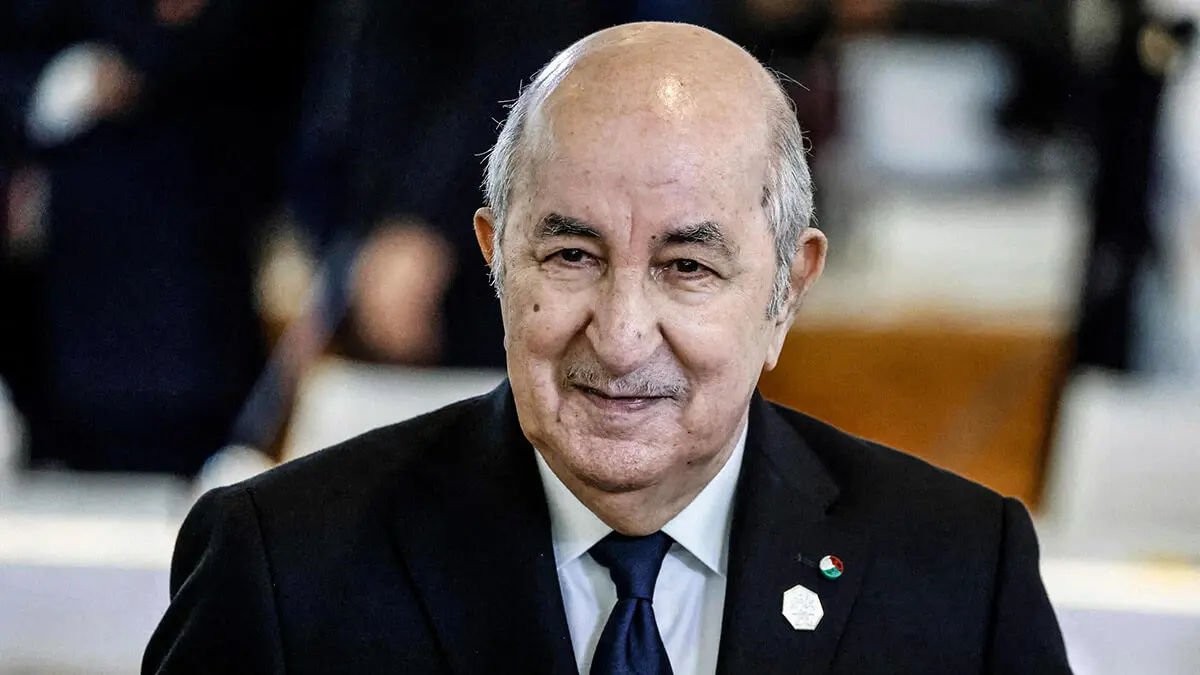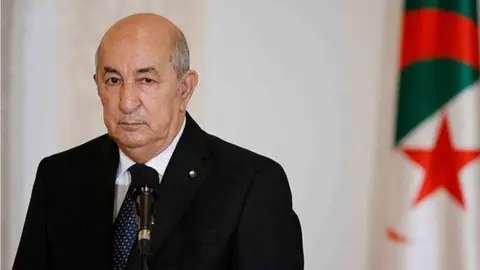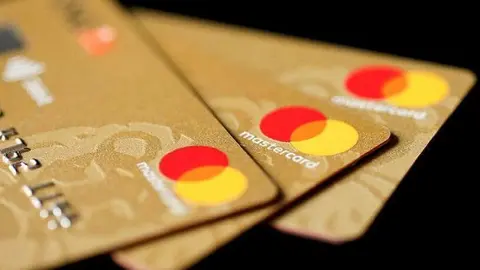Looking beyond conspiracies and assassination plots in Algeria

Alternative world powers have secured a large-scale foothold in Algeria's backyard without the Algerians having any prior knowledge or say in the matter.
It all started with a story circulating for months in Algeria that the country was facing a conspiracy hatched by an ‘evil’ alliance. The Algerian media dwelt at length on the details of this conspiracy. Algerian President Abdelmadjid Tebboune himself spoke about it. For some reason, the powers that be in Algeria tend to believe that they are, for various reasons, the target of plots.
In the last few days, Algerian writers have given explanations on social networks about the suspension of the newspaper ‘Djazaier El Ghad’ (Algeria of tomorrow) and the measures taken to close this publication and hold its managers accountable.
The newspaper had published a front-page article providing additional details about the alleged conspiracy. But it went much further than others in writing that what was at stake was not a vague threat but a plan to assassinate President Tebboune himself. Some analysts said the paper had missed the signals sent by the authorities the day after the election in which Tebboune won a second term in office. Algerians found it hard to see the difference between the photos of those accused by so-called informed sources of plotting against the president, a claim reported by the newspaper, and the photos of the same Arab and foreign leaders, who were praised by the official Algerian news agency and the presidency's official website on the Internet and Facebook. who to believe and who not to believe in Algeria?
The answer to that question was unequivocally given by the authorities, as the newspaper was suspended and procedures were set in motion for its closure. The problem appeared to stem from a simple error of judgement on the part of the newspaper's editors.
The circumstances might initially have required suggesting the existence of a conspiracy against Algeria that came to a head during the presidential elections. But the truth of the matter might be a little more complicated, especially given that Tebboune's first step after taking the constitutional oath was to fire one of the most senior officers in charge of security affairs, namely General Djebbar M'henna, director general of the Directorate of Documentation and External Security (DGDSE), the foreign intelligence agency, and appoint a new general in his place.
It does not take a genius to realise that there is a link between the conspiracy stories and the reorganisation of the foreign intelligence directorate. If there were foreign conspiracies against Algeria or a threat to the life of the president, the first government department to get involved would have been the DGDSE. It is hard to imagine that foreign intelligence officials could not have ignored reports of the alleged conspiracy and details of the plot to assassinate the president.
The basis for the reports, which circulated for months, appears to have been very weak. Even a senior intelligence analyst examining the reports circulating in Algeria last year, including allusions made by the president himself in his televised speeches, would have dismissed them as implausible.
Accusations against Morocco should be set aside, because Algeria's hostility towards its western neighbour has reached a point where Algerian leaders might even decide to undermine their own interests, such as stopping the pumping of gas through Morocco to Spain, only to increase enmity towards the kingdom.
So far, Algerian officials in charge of relations with Morocco have not addressed such legitimate questions as ‘What is Morocco's interest in dismantling Algeria's power structure, whatever its flaws and qualities?’ and ‘Would Morocco be a safer place if, God forbid, the Algerian government were to disintegrate, resulting in the collapse of security in the neighbouring state, ushering in a disastrous situation that would dwarf that of Libya, for example? And then, what is the interest of a country like the UAE in antagonising Algeria and conspiring against it?
The UAE was within its sovereign right when it took the decision to recognise Morocco's sovereignty over its Sahara (which, by the way, is a territory that Algeria does not even claim). The degree of hostility towards the UAE is therefore very difficult to understand.
And what is the interest of France, which has no problem receiving the Algerian army high command with great pomp and ceremony, and which continues military and security coordination with Algiers?
Perhaps the strangest aspect of the conspiracy narrative is the accusation of Israeli involvement. Imagine Israeli Prime Minister Benjamin Netanyahu meeting with the head of the Mossad at the height of the war in Gaza, the West Bank, southern Lebanon and Syria, and in the midst of an ongoing confrontation with the Popular Mobilisation Forces in Iraq, the Houthis in Yemen and the Revolutionary Guards in Iran. Imagine him saying: ‘Now that we have finished discussing how we will assassinate Ismail Haniyeh, find Yahya Sinwar and hunt down Hamas and Hezbollah leaders Saleh al-Arouri, Fouad Shukr and Ibrahim Aqil, let's move on to the issue of overthrowing the Algerian government and assassinating its president’.
Why would Israel do this, because Algeria is sympathetic to the Palestinians, for example, or because Algeria has sent a single shipment of fuel for power generation in Lebanon?
Even if there were people with malicious intent passing such information to Algeria's DGDSE, the first thing one would expect the agency to do would be to examine the information, and also to pass on to the country's leaders and various authorities, as well as to the media, some shred of evidence that would justify conducting a campaign on the alleged plot.
But this certainly did not happen, and the Ministry of Communications was eventually forced to sanction the newspaper that ‘believed’ the conspiracy stories. (Just as a footnote, the Algerian media were kind enough to forget about the arrest of Moroccan nationals who were allegedly caught in an Algerian port trying to smuggle hunting cartridges to influence the elections).
We do not know exactly why General Djebbar M'henna was dismissed and whether his dismissal was related to the alleged conspiracy.
But what is certain is that the Algerian leadership will ask the DGDSE about a very important and sensitive issue that had gone unnoticed by the foreign intelligence service. It is the major changes in the Sahel and Sahara region.
Today, the region has witnessed the emergence of a politico-military alliance following the signing of the Liptako-Gourma pact between Burkina Faso, Mali and Niger, as the three countries shifted their priorities from an alliance with West African countries to cooperation with Western powers.
It is not just a matter of withdrawing French forces participating in the Barkhane force, nor of asking US forces to complete their withdrawal from a local military base. What has happened is that alternative world powers have secured a large-scale foothold in Algeria's backyard without the Algerians having any prior knowledge or say in the matter. After the likely confusing input of the Algerian diplomatic and intelligence apparatus, Algeria's leadership has had to contend with the established presence in the Sahel not only of Russia, but also China, Turkey and even Iran.
The resulting confusion reached its peak when it was unable to adopt an intelligible position on these developments. Algiers no longer knew whether it should support the continued presence in the region of France, the former colonial power despised in Algeria and the region in general, or whether, on the contrary, it should advocate a French exit. Nor could he say whether or not Wagner's troop presence is a healthy manifestation of his relationship with Russia.
Did Algeria coordinate with its friend Recep Tayyip Erdogan over Turkey's presence in the Sahel, and is what is happening on the southern border between Algeria and Mali a border problem or a harbinger of separatist militancy that will affect Algeria before any other country?
When President Tebboune began his first term, he appointed many ambassadors and presidential advisers in charge of relations with African neighbours. Today, we do not even remember the names of these advisors, as they were forgotten after Algeria's successive political and diplomatic setbacks in the region. Now, as Tebboune begins his second term in office, it is clear that he wants to close the chapter of the conspiracy story. Perhaps the time has come for stakeholders to now address the real issues affecting Algerian national security in a volatile and rapidly changing world. It is never too late to start off on the right foot, after events in the Sahel have passed without attracting the attention they deserved.



